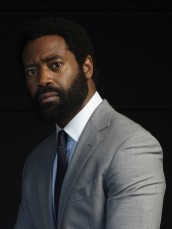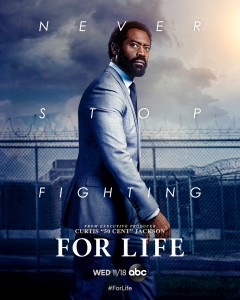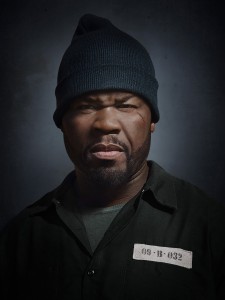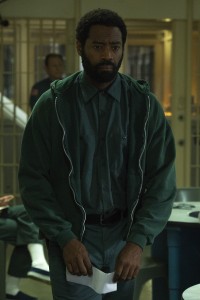In Part 2 of this article on ABC’s Wednesday-night drama FOR LIFE, we continue the discussion of the show’s second season with actors Nicholas Pinnock (who plays recently-exonerated prisoner Aaron Wallace) and Indira Varma (who plays former prison warden Sofiya Masry) and executive producer Curtis “50 Cent” Jackson, series creator Hank Steinberg, and executive producer Isaac Wright Jr., whose life story is the loose basis for the show.
FOR LIFE tackles racism and social class head-on, both topics much on people’s minds at present. Jackson says, “I think the show speaks so loudly to the things that are going on. As we launched Season 1, it was in the middle of COVID, which made television ten times more important. There was no going to a theater to see film, and technology changed what you were doing for entertainment purposes. So, [people] go to the television. They consistently see these images of law enforcement behaving inappropriately. These things, people in inner cities are subjected to them their entire lives. It’s just now being aired and broadcast through social media, because the telephone is now turned into a filming device at the same time, so everyone has it. So, now you can see it, but it’s always been there. It’s not new.”
Jackson continues, “Everybody said it [FOR LIFE] was an amazing project, but if I brought it to you three years earlier, if it took me three more years to get it on, they would be saying I’m a genius. It’s just the climate that it comes in, it feels like the stars are lining up for it, because it’s happening exactly when that’s erupted. You’re seeing a George Floyd situation take place here in America, and you’re seeing protesting in London. It proves that it’s a world issue, it’s not just a local thing that’s taking place, how it’s affecting people personally and how they’re responding to it.
“What has been done well by Hank and the entire writers’ room is balancing being informative in the show, and the entertainment in the show. Because you can become so educational, [put] so much information to it, that it is not fun to watch, because you lose why you watch, why you decided to check it out in the beginning … One season was that representation of nine years of Isaac Wright Jr.’s experience. So, Season 2, you’re going to see him coming out, the trauma of that experience, you’ve been around the worst people you’ve experienced in your life. Think about people who have already committed crimes, who have been involved in situations that have already had themselves sentenced to life in prison. So, now you’re in the belly of the beast with the worst of the worst. The trauma from that can easily be paralleled to a soldier reentering society following a war, the traumas of war itself. And that experience, the way it would be relevant to tell that story, his story would be relevant the same way. You see so many complex character moments happening in the actual project.”
Jackson speaks of FOR LIFE’s potential. “Look at this. We can be done with all of the Isaac Wright pieces, and still have a procedural show that goes on for the next four years, just them having the understanding of why the Aaron Wallace character is behaving the way he’s behaving, because of the journey he’s on. We’ve developed a whole cast. These people, this is how you know the stars are lining up. Look at the talent involved with this show. It makes me look like a genius. I’ll take all of that.”
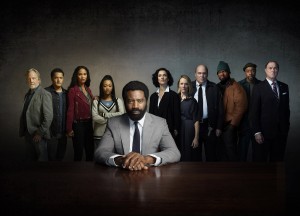
Timothy Busfield as Henry Roswell, Brandon J. Dirden as Darius, Joy Bryant as Marie Wallace, Tyla Harris as Jasmine Wallace, Nicholas Pinnock as Aaron Wallace, Indira Varma as Safiya Masry, Mary Stuart Masterson as Anya Harrison, Glenn Fleshler as Frank Foster, Curtis “50 Cent” Jackson as Cassius, Dorian Missick as Jamal Bishop, and Boris McGiver as Glen Maskins in FOR LIFE – Season 1 | ©2020 ABC/Matthias Clamer
Steinberg laughs, then elaborates. “I think for all of us, the events of this summer really pushed the content of our show even more into the zeitgeist. And of course, now we’re going to find a way to integrate Aaron Wallace into the reality of the events that happened over the summer, and have his journey segue into what’s happening in the real world. And that’s really exciting, challenging, daunting, and we feel like we have a lot of responsibility, but we also have a huge opportunity.”
Varma adds, “I think, following the demonstrations and Black Lives Matter and all that, it feels very much like these problems, this discrimination, has been going on since forever, as 50’s been saying. But for once, people are actually hearing it. And people are given voice. We are hearing those people who have never been given voice before. And I think in a way what’s great about this show coming out now, at this time, is that we’re hearing the voices of people that are not always heard. And I think it’s an amazing opportunity, and huge responsibility for our team.”
Wright observes, “One of the things that the present environment highlights, and that would include social media, is the true challenge that Aaron had coming in nine years, and also an obvious reflection of the true challenge that I had. You have to remember something – this [Wright’s actual incarceration] happened in the ‘90s. There was no social media, and they were annihilating minorities and the poor with impunity. And so the feat that Aaron as a character has, and the feat that I had at that time, moving through the system, and even getting a police officer to confess [to having acted wrongly in Wright’s case], it had to have been the next thing to Christ walking on water, in terms the general public not even understanding that these things even existed. A police officer would get on the stand and say that the sun was blue, and they believed him. That’s the kind of honor that they came into court with, regardless of what they were saying was true or false. And so, the environment that we’re dealing with today, and the things that Aaron as a character is dealing with today, just highlights the difficulty of nine years ago, when he first got in, and the challenges that he had through those nine years. So, I think that’s an incredible aspect of the show that you can reflect on. If that’s going on today, what the hell was it really like when he first went in jail?”
How does Aaron deal with the brave new world that greets him outside the prison walls? “Listen,” Pinnock says, “it’s a shock for him. He’s definitely dealing with a lot, trying to be a lawyer in the outside world, plus dealing with his life on the outside, his relationship with Marie, his relationship with Jasmine, his relationship with Roswell, and his relationship with himself, more importantly, being a free man. But he does everything as he did before, with sheer determination and focus. And so, when he’s dealing with things like COVID, and he’s dealing with things like Black Lives Matter, which has elements of what we’re going to be exploring, he has that dogged determination and focus and drive, and passion for what he does, and for making sure that the injustices of the world are highlighted and overturned.”
What was the transition from prison to freedom like for Wright in reality? “That was a very significant aspect of my life,” Wright replies, “that I had very long conversations with Hank and the writers’ room about, because Aaron was getting ready to exit, and they really needed to understand what that was like. The way that I can describe it is, I was sick for about two years, which means that I was irregular. Everything was out of place. It took me at least two years to kind of get back to normalcy. I was even sick in school, and the challenges that I was having, going through college, being sick was really incredible.”
Wright continues, “But I can tell you that everything was different. When I went away, you carried a cell phone in a briefcase on your shoulder, and when I got out, you could put it in your pocket. And so, the changes that had taken place, along with the fact that I was still unbalanced, I was irregular, it was a very challenging time for me.”
Aaron has zero faith in the police and in the corrupt district attorney’s office, but at the same time believes fervently in the law. How does Pinnock reconcile this apparent paradox in the man he plays?
“With a lot of difficulty, really,” Pinnock responds. “A man being incarcerated, wanting and trying to prove he’s innocent, is something that I think – and Isaac will tell you – you carry with you even when you leave. Those people who are responsible will always be responsible for you having lost that time in your life. And so, it’s difficult for Aaron to gauge and to calibrate those things, and he’s constantly having to navigate himself through those journeys in everything he does when he’s on the outside, in everything he’s going through. Even if we don’t see it, it’s not part of the language of the show, in everything that I do in portraying Aaron, those are things that I’m thinking, ‘How does he feel about this thing? How does he navigate this thing?’ Even though it seems easy, there’s a lot going on in the cogs of his head, and he’s constantly thinking about things, things that are weighing on him on a regular basis. So even in the smallest things that he’s doing, those very same [thoughts] are very, very present.”
As well as being an executive producer, Jackson had a recurring role in FOR LIFE Season 1 as violent, manipulative inmate Cassius Dawkins. Will we see that character again?
Jackson laughs and teases, “There’s a possibility. You feel his presence, definitely.”
Steinberg laughs as well. “There’s no question, wherever 50 goes, his presence is felt. The character is still looming out there, and we can just tell you that he does survive the incident in the riot. He will be back. When and where and how is yet to be determined.”
“Hooray,” Jackson quips.
What else would the actors and creators like people to know going into FOR LIFE Season 2?
Pinnock says, “I personally feel what you saw in Season 1, and what you gravitated toward, what you identified with, what you connected to, are all going to be there and then some. I loved Season 1, I just think Season 2 is going to be better. It has a pull that, if you’d seen Season 1, you’re going to want and love Season 2 even more. I think, with the actors and the creatives, we’ve put so much into it, and we’ve enjoyed the process of uncovering these layers of the characters and the stories. If the audience can understand it in the way that we depicted it, if they can get an essence of how we felt doing it, and what it really means to us, then absolutely, it will be a stronger season than Season 1. And Season 1 was already really strong.
Jackson agrees. “For anyone who hasn’t had the opportunity to see it, they should start checking it out now, Season 1, and lead into Season 2, because we’re just going up. Hank did an amazing job. You’ve got a hard job, Hank, and a whole team to run.”
Wright offers, “One of the things that I want to say about this show, and I think that people are going to appreciate, is the way in which Aaron evolved, the way in which we see his brilliance evolve, and the way in which his thinking was more and more outside the box. So, if you watched Season 1 to the fullest, and you see him win his retrial, you haven’t seen anything yet, until you see the first episode of Season 2. The brilliance is not going to reach its peak, but the way in which he flips it – even on some of my good days, when I’ve watched some of my most exciting dramas and incredible superheroes, Aaron actually does it best in Season 1. So, I think the public is going to get something in Episode 1 in Season 2 that they’re never, ever, ever going to expect. I loved every minute of it. So, the way Season 2 starts out is a platform to this epicenter that it’s going to be reaching by the time it ends. Hank did a great job, all of the rest of the guys in the writers’ room did a great job, and I’m honored. I mean, I don’t know what to say. I’m honored, and I think the audience, the general public, is going to be honored about it also.
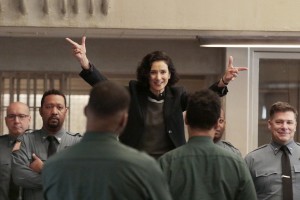
ndira Varma as Safiya Masry in FOR LIFE – Season 1 – “Character and Fitness” | ©2020 ABC/Giovanni Rufino
Pinnock concludes, “When I read the first episode of Season 2, it didn’t feel it was a hangover from Season 1 that was needed for the first episode of Season 2. It felt like its own show immediately, and for me, that’s what a Season 2 [premiere] needs to feel like. If you don’t watch Season 1, you can start from there and go, ‘S***, it’s amazing.’ And that’s how I felt when I read it. And then, through the process of delivering the depiction of Aaron and telling that story, even more so. It feels like it’s on its own track, not Season 1 is a train, and then Season 2 follows it. No. Season 1 is on one track, and Season 2 is on another. And I think that’s what’s going to make it so strong.”
Related: Interview with FOR LIFE actress Indira Varma on Season 1 of the ABC drama
Related: Exclusive Interview with FOR LIFE star Nicholas Pinnock on Season 1 of the ABC drama
Related: Interview with FOR LIFE executive producer and actor Curtis “50 Cent” Jackson on the new ABC series
Follow us on Twitter at ASSIGNMENT X
Like us on Facebook at ASSIGNMENT X
Article Source: Assignment X
Article: Interview with FOR LIFE actors Nicholas Pinnock, Indira Varma executive producer Curtis “50 Cent” Jackson and the creators on Season 2 of the ABC Drama – Part 2
Related Posts:




